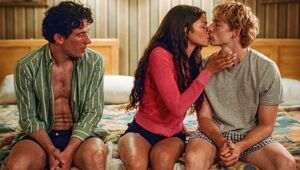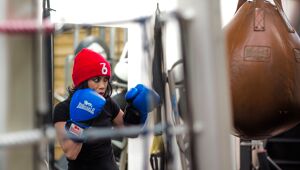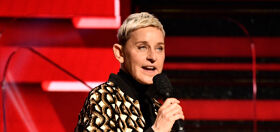
“It’s windy outside!” Jordan Doww yelps in exasperation.
He enters the coffee shop in a dark pair of Ray Bans and a backward-turned hat, his thick auburn bangs flowing out from the sizing loop. Doww explains he needed the hat to combat the Santa Ana winds, which have littered the San Fernando Valley with piles of leaves ripped off their trees.
Doww and I have come together to chat about his new film Reach which opens October 19 in select theatres and on video on demand. Doww plays Nick, an emotionally disturbed bully and arch-nemesis of the film’s hero, Stephen, played by Garrett Clayton. Directed by first time helmer Leif Rokesh, the indie drama follows the suicidal Stephen as he struggles to find purpose, and resolve a mysterious childhood incident that ended his friendship with Nick.
The film marks a major departure for Doww, who jump-started his acting career by appearing in YouTube comedy videos. It also presented an opportunity for him to work with Clayton, a good friend, and frequent rival for the same roles.
How about we take this to the next level?
Our newsletter is like a refreshing cocktail (or mocktail) of LGBTQ+ entertainment and pop culture, served up with a side of eye-candy.
Doww settles in with his coffee, a brownie, and a big smile, ready to chat about the film.
So how did Reach come to you? You’re more known for comedy.
It’s funny. I’ve been doing comedy—theatre. And before I did that, I even did a tour, a comedy that I wrote and produced. But I always told myself, I could so see myself doing something serious. And I was like, “I want to do a drama film.”
So there came this one week…I was really going for it. At the time, I hadn’t really done much work [in film]. I had this one week where I had audition after audition, three a day one day, and two the next day.
And these were for all different projects?
Yeah, all in a matter of a week. But the meat of it was in these two days. There were so many that I couldn’t focus on all of them. I went to one, left it, went to another, left it. I was distraught and totally upset that I wasn’t going to book any of them because I was just terrible. I remember leaving this one, Reach, and thinking “ok, that felt better.” Then the next audition, terrible. And after that week, I was seriously considering taking some time off because I consistently wasn’t proud of my work. So I was literally was texting my friend this long ass message, basically saying I’m not having the best week, I’m thinking of taking some time at home. Legit when I send the text…I hadn’t even pushed send yet, my manager calls me. I had originally auditioned for the role of Stephen [in Reach], played by Garrett Clayton. [My manager] called me and said they wanted me for the role, they had me on avail. And they wanted me to play the part of Nick Perkins. And I said, “isn’t he the bully? I can’t play that!” And my manager literally told me that the director, the casting director, the producers all thought I could nail this role. So that was a lot of pressure.
So you didn’t say ‘yes’ right away?
I went home that night, and I was thinking about it. I read the script more and thought [Nick’s] insane. I had no idea how I was going to do this role. But I was like, this is going to be a challenge I’ll remember forever. Let’s do it. So I signed on and created a backstory with the director [Leif Rokesh] and got to spend some time learning more about this guy on paper and on screen. Deep down, he’s dealing with so much stuff. He’s an onion.
What sort of direction did Leif give you as far as the backstory?
Our director sort of found a way to bring the character out through my own experience, and also, examining every possible angle of why is this person this way, why someone thinks that way.

Nick is the most complicated character in the film. He’s leading three different lives—his home life, which is a nightmare, his school life with his girlfriend, where he’s popular, and then his private life, with his boyfriend. So my question is what is his absolute? Is he gay? Is he fluid?
Nick, at the core, is confused. I think he’s trying. I think he’s wanting to give himself the chance to explore, and he feels guilty about it. He feels so guilty. He’s embarrassed. People question his authority, and they question him.
He’s also someone with a lot of pain and anger in his history. It’s interesting that he chooses to vent all his anger at Stephen, who’s sort of tangential to it all.
They have a long family history of drama. In the movie, me and Stephen used to be best friends but our family, once something happened, our dads stopped letting us hang out with each other. They grew to resent each other in their work, and that kind of grew up with us too. So then I take that out on him at school, because of the hurt that I get at home.
Related: Former Disney star Garrett Clayton comes out, introduces fans to his boyfriend
Was this something you talked to Garrett about?
Garrett actually…100%. Again, I was so unsure of how I was going to tackle this role. Garrett and Kevin Sizemore were easily my biggest help in this movie. They would pull me aside and really get this character out of me. They would push me to my limits.
How did they do that?
Garrett literally pushed me.
[Laugher]
So did Kevin. Yeah, we would call “cut” and go walk and talk about it. That really helped because it a struggle to tap into this character, but thanks to them I did. I hope I did it justice.
What’s the on-set dynamic like then? Because the main cast is primarily younger people, people the same age. Then you have the parent actors, Corbin Bersen and Kevin Sizemore. Are you guys laughing? Is it a dour affair?
It’s a pretty uplifting movie in general. When we were between takes, it was pretty much fun time on set. I was eating all the time.
[Laughter]
Our crafting was really good. It was pretty fun. Everyone was down. We were making this movie together. We made it in two weeks, which is kind of hectic. Long days. But we kind of all just became one big family.
That’s awesome. So bullying is a major theme in the film. What’s ironic to me is that the film is set in a performing arts school. You know, it’s usually the performing arts kids getting picked on in a public school.
There’s still bullying, there are still cliques.
What is it about high school that just breeds bullying? Were you bullied at that age?
I had my moments. I think it all boils down to what’s going on at home. I mean, some people are born mean. Some people are born evil. But I really think that happens with experience. Maybe they’re not happy, maybe their families have issues. Maybe their relationships have issues. I think it’s all a portrayal of what’s going on inside.
It’s weird to think that it’s still going on today, and that with social media, there’s just so much exposure. It’s almost like hyperactivity.
And the internet removes culpability so easily.
Yeah. Cyberbullying is real. And it is happening in [Nick’s] life.
You personally have some extremely emotionally draining scenes. How do you prepare for that?
There was one scene specifically with me and my dad, the guy who plays my dad, Kevin. He’s a beautiful human. He’s a beautiful man, and his family is beautiful. He’s like the nicest guy I’ve ever met. But he really captured this character. He really helped me tap into my character. There’s a scene where we get in a physical altercation and that took me a minute. It took me a very long time to accept the reality. So sometimes takes felt too real. And I would have to run off and cry. I would run out of that scene crying, and I would get anxiety and be shaking.

Wow.
It’s definitely a headspace. For the duration of that scene, I was definitely in a mindset and I couldn’t be bothered. So in between takes of that one, I was like, don’t bother me. I need to process what’s going on. I need to know that it’s not real. That scene was probably the hardest for me to do. There are harder scenes in the film, but they were easier because I don’t connect to them as easily.
That’s interesting.
They were so unlike me. You know, I grew up with divorced parents. I also was battling my own demons of depression and anxiety and sexual identity. And in this fight, that was all coming out. So it felt very real. I can’t even watch it.
Really?
Yeah. I literally like [hides face in hands]. I showed it to my mom and it was really hard for her to watch too.
How did she react?
She just felt bad. She goes “honey, no! I don’t want this to happen to you. Are you ok?” And I was fine, whereas back when [we were shooting] I would go home and take a bath with wine and watch kitten videos.
Because that was the only way—
It was a way to reset, yeah.
So how does Leif direct you in those scenes?
He’s very respectful of my time, very respectful of my moments. He didn’t want me to go too far, but wanted me to go far enough. Because I didn’t want to get to the point where I was scarred, but I also wanted to do the role justice. And if I wanted to do another take, we’d do another take. Sometimes, you don’t do that. I worked on a Lifetime movie and we did two takes and that was it. This one, we really got to spend some time to get to the best product.
So this question’s a bit more general, not as much about your role. What’s your experience been as an actor, out in the business?
Someone asked me the other day if it helped me or if it hurt. And I didn’t know how to answer that because it did both. When I came out, I came out at 19 over the internet with a YouTube video. But as far as acting, since that was what I was known for at the time, I would sort of walk into a room and if they even saw a hint of gay, I already wasn’t considered for the role. I just remember feeling this sense of I’m doing my best and I know they’re not taking me seriously because I may appear gay.
But here’s the thing, here’s what I then started to notice: I would walk into rooms and be my bubbly, happy self and kill it on camera in this “straight” role, and I would still not be considered for the role. Now, the lines are completely blurred. Now, I’m reading for straight characters and I’m getting straight characters. But I also have a year of gay roles. Thankfully now we’re at a time where that doesn’t matter. Same thing with a number of followers.
You mean the number of followers on your YouTube or Twitter or whatever?
Yeah, and that’s a whole other story.

I know, for me, there was a period when I would look for writing jobs and have to include my number of followers on Twitter or Instagram or whatever. I always found that silly because I was focused on doing the actual job.
So I’ve been here for four years. My first year here I didn’t do too much. I would go out on auditions, and I would walk in the room and someone would ask me before I even read the material how many followers I had. And I was literally so baffled. I was like why does this matter? And they were like “we just want to know.” So I would give them a number, and they would all sit back in their seats. Like, I wasn’t even considered. And year two, all these “influencers” were in all these movies and TV, and ratings were still coveted. So year two, I would walk into the room with followers and not consider me because I was an “influencer.” And I’m like, but I’m an actor first. YouTube is just a thing I do. Year three and four, I now can go in with the talent first.
So what’s next for you?
So I’ve taken some time off to do some stage work. I just wrapped up Hairspray playing Link, which is so funny because Garrett played Link [in Hairspray Live!]. And I was up for that role too; I definitely had callbacks for it. And when Garrett got it, it was so cool, but I didn’t know him at that time. I actually met him at a party, a very intimate party where we all played board games. And I found out we are from the same town. And then a few months after, we booked the same movie. I love that kid so much. We call each other every now and then and update each other. I love him.
Reach opens October 19 in select cities and on streaming services.




















